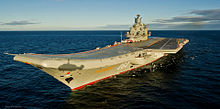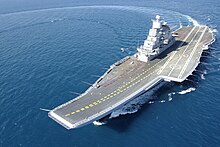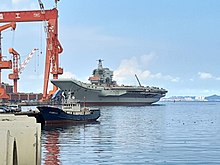STOBAR

STOBAR ("short take-off, barrier-arrested recovery") is a system used for the launch and recovery of aircraft from the deck of an aircraft carrier, combining elements of "short take-off and vertical landing" (STOVL) with "catapult-assisted take-off, barrier-arrested recovery" (CATOBAR).
Aircraft launch under their own power using a ski-jump to assist take-off (rather than using a catapult). However, the planes are conventional, rather than STOVL aircraft, and thus require arrestor wires to land on the ship. The STOBAR system is simpler to build than CATOBAR. As of 2018[update], it has been used widely on Russian, Indian, and Chinese carriers.
Advantages
Compared to CATOBAR, STOBAR is less expensive to develop. It is easier to operate than a CATOBAR configuration, which requires large number of operators to launch the aircraft. The lack of any moving parts in a ski-jump makes it less expensive to maintain than a catapult.[1][2] It does not require any additional system to generate force required to launch the aircraft, unlike CATOBAR where an external force is needed to be generated either from steam catapult[3] or Electromagnetic Aircraft Launch System (EMALS)[4] to launch the aircraft.
Limitations

One major limitation of STOBAR configuration is that it only works with fighter aircraft that have a high thrust-to-weight ratio such as Su-33 or MiG-29K and thus limits the kind of aircraft that can be operated from the carrier. It is not known[who?] what restrictions ski-jump takeoff implies on maximal aircraft weight. According to some sources, in order to become airborne, the aircraft may be required to limit its weaponry and fuel package in order to reduce the launch weight of the aircraft.[1][5] However, according to other sources,[6] the Super Hornet can take-off from a ski-jump with a significant weapons load. Using ski-jump can limit the ability to conduct sorties faster on STOBAR aircraft carrier.[7] STOBAR carriers must maintain a speed of 20–30 kn (37–56 km/h) in order to generate wind speed required on deck which is essential for conducting aircraft launch operations.[8]
List of STOBAR aircraft
- HAL Tejas – two naval variants are being developed for the Indian Navy; a prototype (NP-1) is currently undergoing flight testing.[9][10][11]
- Mikoyan MiG-29K – currently active with the Indian Navy and the Russian Navy.
- Shenyang J-15 – partially based on the Su-33, operated by the People's Liberation Army Navy on Liaoning.[12]
- Sukhoi Su-33 – developed from Su-27 and only operated by the Russian Navy.
Users
As of April 2024, three countries currently operate STOBAR-type carriers; Russia and China are the only countries that have built a STOBAR ship for operation, while both India and China have procured STOBAR ships that were built by Russia and have had them converted for their own use. India is in the process of inducting its first indigenous aircraft carrier which is undergoing extensive sea trials.
Active STOBAR aircraft carriers
| Class | Image | Origin | No. of ships | Propulsion | Displacement | Operator | Aircraft carried | Notes |
|---|---|---|---|---|---|---|---|---|
| Kuznetsov | 
|
Soviet Union | 1 | Steam turbine | 58,000 tons | Russian Navy | ||
| 1 | People's Liberation Army Navy | |||||||
| Kiev (INS Vikramaditya) | 
|
Soviet Union | 1 | Steam turbine | 45,500 tons | Indian Navy | Built as STOVL carrier and converted to STOBAR | |
| Shandong | 
|
China | 1 | Steam turbine | 70,000 tons | People's Liberation Army Navy |
|
Upgraded Kuznetsov type design, first aircraft carrier built in China |
| Vikrant | 
|
India | 1 | Gas turbine | 45,000 tonnes | Indian Navy | First aircraft carrier built in India[13] |
References
- ^ a b Head, Jeff (7 April 2014). "What are the carriers?". World-Wide Aircraft Carriers. Retrieved 26 July 2019 – via Freewebs.
- ^ Li, Nan; Weuve, Christopher (2010). "China's Aircraft Carrier Ambitions". Naval War College Review. 63 (1): 20. Archived from the original on 27 July 2010.
- ^ "Chapter 4. Steam-Powered Catapults" (PDF). Aviation Boatswain's. Mate E. NAVEDTRA 14310 (Nonresident Training Course). Naval Education and Training Professional Development and Technology Center. July 2001 – via GlobalSecurity.org.
- ^ "EMALS: Next Gen Catapult". Defense Tech. 5 April 2007. Archived from the original on 20 June 2010.
- ^ "How Effective Will China's Carrier-Based Fighters Be?". Defense Tech. 25 April 2012. Archived from the original on 27 April 2012.
- ^ Singh, Rahul (14 May 2008). "Now Navy wants Super Hornets too". Hindustan Times. Retrieved 3 December 2018.
In our simulation, we discovered that not only could the Super Hornet take-off from a ski-jump, but could do so with a significant weapons load.
- ^ Ankit, Panda (24 April 2015). "US-India Collaboration on Aircraft Carriers: A Good Idea?". The Diplomat. Retrieved 26 July 2019.
- ^ "Indian Navy seeks EMALS system for second Vikrant-class aircraft carrier". Naval Technology. 29 May 2013. Retrieved 26 July 2019.
- ^ Kumar, Chethan (25 April 2012). "LCA naval variant's first flight on Friday". Deccan Herald. Archived from the original on 2 February 2014. Retrieved 26 July 2019.
- ^ "Maiden flight by 2nd prototype of LCA Tejas' naval variant". The Economic Times. Press Trust of India. 7 February 2015. Archived from the original on 11 February 2015. Retrieved 26 July 2019.
- ^ "Naval Version of Light Combat Aircraft Rolls out a Defining and Memorable Occasion for the Nation – Antony". Press Information Bureau. 6 July 2010. Archived from the original on 5 August 2011. Retrieved 26 July 2019.
- ^ "J-15 successfully landed on China's carrier Liaoning: Navy". Sina English. Xinhua News Agency. 25 November 2012. Archived from the original on 28 November 2012. Retrieved 26 July 2019.
- ^ "India's first indigenous aircraft carrier INS VIKRANT(IAC1) is out for trials". Defence Aviation Post. 17 October 2020. Archived from the original on 18 October 2020. Retrieved 18 October 2020.
